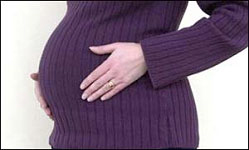
Dr. Joachim Heinrich, of GSF-Institute of Epidemiology, Neuherberg, Germany, and colleagues studied the relations between maternal diet during the last 4 weeks of pregnancy and allergies and eczema in offspring at age 2 years.
They analyzed data from 2,641 children. Overall, 17.7 percent of all children had doctor-diagnosed eczema at age 2. A total of 9.3 percent were sensitized to food allergens, most commonly milk and eggs, and 4.8 percent were sensitized to inhaled allergens.
After adjusting for potentially confounding factors, positive associations were observed between high maternal intakes of margarine and vegetable oils during the last 4 weeks of pregnancy and eczema during the first 2 years in the offspring.
On the other hand, eating a lot of fish late in pregnancy seemed to offer some protection against eczema in offspring.
Furthermore, the study found that children born to women who consumed a lot of celery and citrus fruit were at a greater risk for sensitization to food allergens. Sensitization to inhaled allergens was also associated with high maternal intakes of deep-frying vegetable fat, raw sweet pepper and citrus fruit.
Inspite of these clear cut relations, the researchers say “before any recommendations can be made, randomized clinical intervention trials should be performed to confirm the cause-effect relation observed in the present study.”
